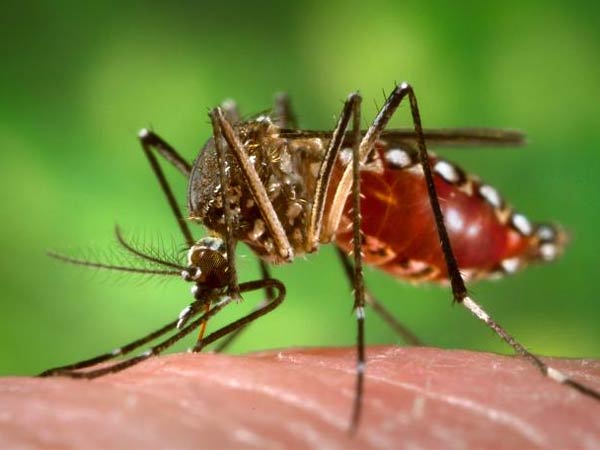Chikungunya (pronunciation: \chik-en-gun-ye) virus is transmitted to people by mosquitoes. During the first week of infection, chikungunya virus can be found in the blood and passed from an infected person to a mosquito through mosquito bites. An infected mosquito can then spread the virus to other people. Outbreaks have occurred in countries in Africa, Asia, Europe, and the Indian and Pacific Oceans.
In late 2013, chikungunya virus was found for the first time in the Americas on islands in the Caribbean. There is a risk that the virus will be imported to new areas by infected travelers. There is no vaccine to prevent or medicine to treat chikungunya virus infection. Travelers can protect themselves by preventing mosquito bites. When traveling to countries with chikungunya virus, use insect repellent, wear long sleeves and pants, and stay in places with air conditioning or that use window and door screens.
Clinical Signs & Symptoms
The majority of people infected with chikungunya virus become symptomatic. The incubation period is typically 3–7 days (range, 1–12 days). The disease is most often characterized by acute onset of fever (typically >39°C [102°F]) and polyarthralgia. Joint symptoms are usually bilateral and symmetric, and can be severe and debilitating. Other symptoms may include headache, myalgia, arthritis, conjunctivitis, nausea/vomiting, or maculopapular rash. Clinical laboratory findings can include lymphopenia, thrombocytopenia, elevated creatinine, and elevated hepatic transaminases.
Acute symptoms typically resolve within 7–10 days. Rare complications include uveitis, retinitis, myocarditis, hepatitis, nephritis, bullous skin lesions, hemorrhage, meningoencephalitis, myelitis, Guillain-Barré syndrome, and cranial nerve palsies. Persons at risk for severe disease include neonates exposed intrapartum, older adults (e.g., > 65 years), and persons with underlying medical conditions (e.g., hypertension, diabetes, or cardiovascular disease). Some patients might have relapse of rheumatologic symptoms (e.g., polyarthralgia, polyarthritis, tenosynovitis) in the months following acute illness. Studies report variable proportions of patients with persistent joint pains for months to years. Mortality is rare and occurs mostly in older adults.
Symptoms
Most people infected with chikungunya virus will develop some symptoms.
Symptoms usually begin 3–7 days after being bitten by an infected mosquito.
The most common symptoms are fever and joint pain.
Other symptoms may include headache, muscle pain, joint swelling, or rash.
Chikungunya disease does not often result in death, but the symptoms can be severe and disabling.
Most patients feel better within a week. In some people, the joint pain may persist for months.
People at risk for more severe disease include newborns infected around the time of birth, older adults (≥65 years), and people with medical conditions such as high blood pressure, diabetes, or heart disease.
Once a person has been infected, he or she is likely to be protected from future infections.
Diagnosis
Laboratory diagnosis is generally accomplished by testing serum or plasma to detect virus, viral nucleic acid, or virus-specific immunoglobulin (Ig) M and neutralizing antibodies. Viral culture may detect virus in the first 3 days of illness; however, chikungunya virus should be handled under biosafety level (BSL) 3 conditions. During the first 8 days of illness, chikungunya viral RNA can often be identified in serum. Chikungunya virus antibodies normally develop toward the end of the first week of illness. Therefore, to definitively rule out the diagnosis, convalescent-phase samples should be obtained from patients whose acute-phase samples test negative.
Treatment
There is no vaccine to prevent or medicine to treat chikungunya virus.
Treat the symptoms:
Get plenty of rest.
Drink fluids to prevent dehydration.
Paracetamol to reduce fever and pain.
Do not use aspirin and other non-steroidal anti-inflammatory drugs (NSAIDS until dengue can be ruled out to reduce the risk of bleeding).
Prevention
No vaccine exists to prevent chikungunya virus infection or disease.
Prevent chikungunya virus infection by avoiding mosquito bites.
The mosquitoes that spread the chikungunya virus bite mostly during the daytime.
Protect from Mosquito Bites
Use air conditioning or window/door screens to keep mosquitoes outside. Use mosquito bed net.
Help reduce the number of mosquitoes outside home or hotel room by emptying standing water from containers such as flowerpots or buckets.
When weather permits, wear long-sleeved shirts and long pants.
Use insect repellents

